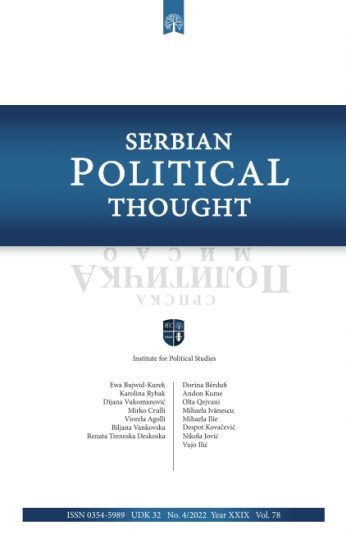Main topic
CONTENTS
THE LIBERAL CRITIQUES OF DEMOCRACY FROM TOCQUEVILLE TO HERMANN-HOPPE
Abstract
In my article I would like to analyze a tradition created by Alexis de Tocqueville which Erik von Kuehnelt-Leddihn called “true liberalism.” According to this political theory, “liberty” and “equality” do not complement each other but are in fact contradictions. In my lecture I would like to analyze how the words “democracy” and “liberty” were evaluated in the texts of the early liberals, how and why they began to be equated with each other. In this article, I will examine three representatives of this tradition in more detail: James Fitzjames Stephen, Erik von Kuehnelt-Leddihn, and Hans-Hermann Hoppe.In the modern age – argue the liberal critiques of democracy – the lack of freedom is manifested evidently. Liberty was first eradicated by royal absolutisms and then by successive democratic revolutions. As a result, the vacuum created was replaced by the modern state with Weberian “bureaucratic authority.” Modern state bureaucracy overwhelmed all sorts of public bodies, ordinances, provinces and other liberties for the sake of the abstract concept of “liberty.” On the one hand, this was done in the name of equality proclaimed on the basis of parliamentary popular sovereignty, and on the other hand it was a product of totalitarianism. of the result these processes in the modern world – while liberty is constantly being eulogized and has been raised to the rank of an official ideology – there is actually less freedom than in any previous era.
References
- Dunn J. (1993): Western Political Theory in the Face of the Future, 2nd edition. Cambridge: Cambridge University Press.
- Eliot, T. S. (1939) The Idea of a Christian Society. London: Faber and Faber Limited.
- Evola, J. (1968) “I due volti del liberalism”, Il Borghese, October: p. 253–55.
- Gray, John. (1995) Liberalism. Minneapolis: University of Minnesota Press.
- Hoppe, Hans-Hermann (2007) Democracy: The God that Failed. The economic and politics of Democracy, Monarchy, and Natural Order. Transaction Publishers: New Brunswick and London.
- Kuehnelt-Leddihn, Erik von (Campbell F. S.) (1943) The Menace of the Herd, or Procrustes at large. Milwaukee: The Bruce Publishing Company.
- Kuehnelt-Leddihn, Erik von (1952) Liberty or Equality. The challenge of our time. Caldwell: Caxton Printers.
- Kuehnelt-Leddihn, Erik von (1974) Leftism: From de Sade and Marx to Hitler and Marcuse. New York: Arlington House Publishers.
- Millner, D. (1987) “Democracy.” In: Millner D., Goleman J. Conolly W. (eds.) Blackwell Encyclopedia of Political Thought. Wiley-Blackwell.
- Oblinger. G. A. (2009) “Ein „katolischer, rechstradikaler Liberaler.” Zum 100. Geburtstag von Erik von Kuehnelt-Leddihn.” Sezession, Juni. p. 39.
- Skorpusky, J. “The liberal critique of democracy”. In: Bell, D.A. (ed.) The East Asian Challenge for Democracy: Political Meritocracy in Comparative Perspective. Cambridge University Press, 2003.
- Stephen, J.F. (1993) Liberty, Equality, Fraternity. 2 Indianapolis: Liberty Fund. (Original work published 1873).
- Tocqueville, Alexis de (1856): The Old Regime and the Revolution. New York: Harper and Brothers.
- Tocqueville, Alexis de (2000): Democracy in America, (H Mansfield, D Winthrop Trans.) Chicago: University of Chicago. (Original work published 1835,1840).
- Yolland, A. D. (1909) “The National Spirit in Hungarian Literature (1686-1900.)” In. Ward, A. W. Prothero, G.W, Leathes S. (eds.): The Cambridge Modern History. Cambridge: At the University.

